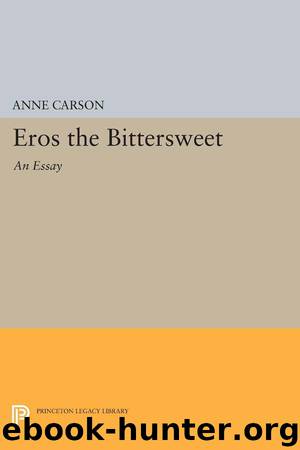Eros the Bittersweet: An Essay by Carson Anne

Author:Carson, Anne
Language: eng
Format: epub
Publisher: Princeton University Press
Published: 2015-02-15T16:00:00+00:00
Letters, Letters
‘Letters’ (grammata) can mean ‘letters of the alphabet’ and also ‘epistles’ in Greek as in English. Novels contain letters of both kinds, and offer two different perspectives on the blind point of desire. Letters in the broad sense, that is to say the floating ruse of the novel as a written text, provide erotic tension on the level of the reading experience. There is a triangular circuit running from the writer to the reader to the characters in the story; when its circuit-points connect, the difficult pleasure of paradox can be felt like an electrification. Letters in the narrower sense, epistles or written messages, function within the plots of various novels as a means of erotic subterfuge between characters. The effect is as you would expect: triangular, paradoxical, electric. In the numerous epistolary scenarios to be found in ancient novels, letters are never used to convey a direct declaration of love between lover and beloved. Letters stand oblique to the action and unfold a three-cornered relation: A writes to C about B, or B reads a letter from C in the presence of A, and so on. When letters are read in novels, the immediate consequence is to inject paradox into lover’s emotions (pleasure and pain at once) and into their strategies (now obstructed by an absent presence).
Consider a novel of Achilles Tatius (third-fourth century A.D.) called Clitophon and Leucippe. The hero (Clitophon), who believes his beloved (Leucippe) to be dead, is on the point of marrying another woman when he receives a letter from Leucippe. He interrupts the wedding to read Leucippe’s letter, which brings her “before the eyes of his soul” and starts a deep blush of shame on his cheek “as if he had been caught in the very act of adultery” (5.19). Clitophon immediately sits down to write a reply “dictated by Eros himself.” Its opening lines neatly plot out the three-point circuit connecting lover, beloved and grammata in their standard angles:
“Χαῖρέ μοι. ὦ δέσποινα Λευκίππη. δυστυχῶ μὲν ἐν οἷς εὐτυχῶ, ὅτι σὲ παρὼν παροῦσαν ὡς ἀποδημοῦσαν ὁρῶ διὰ γραμμάτων.”
“Hail, my lady Leucippe. I am miserable in the midst of joy because I see you present and at the same time absent in your letter.” (5.20)
Clitophon goes on in the letter to proclaim his love and entreat Leucippe to maintain her desire until he can unite with her. Written letters have the presence and authority of a third person, who is witness, judge and conduit of erotic charges. Letters are the mechanism of erotic paradox, at once connective and separative, painful and sweet. Letters construct the space of desire and kindle in it those contradictory emotions that keep the lover alert to his own impasse. Letters arrest and complicate an existing two-term situation by conjuring a third person who is not literally there, making suddenly visible the difference between what is (the actual and present erotic relation between Clitophon and the other woman) and what could be (the ideal love of Clitophon and Leucippe). Letters project the ideal on a screen of the actual.
Download
This site does not store any files on its server. We only index and link to content provided by other sites. Please contact the content providers to delete copyright contents if any and email us, we'll remove relevant links or contents immediately.
| Ancient & Classical | Arthurian Romance |
| Beat Generation | Feminist |
| Gothic & Romantic | LGBT |
| Medieval | Modern |
| Modernism | Postmodernism |
| Renaissance | Shakespeare |
| Surrealism | Victorian |
4 3 2 1: A Novel by Paul Auster(12363)
The handmaid's tale by Margaret Atwood(7750)
Giovanni's Room by James Baldwin(7316)
Asking the Right Questions: A Guide to Critical Thinking by M. Neil Browne & Stuart M. Keeley(5752)
Big Magic: Creative Living Beyond Fear by Elizabeth Gilbert(5749)
Ego Is the Enemy by Ryan Holiday(5412)
The Body: A Guide for Occupants by Bill Bryson(5075)
On Writing A Memoir of the Craft by Stephen King(4925)
Ken Follett - World without end by Ken Follett(4719)
Adulting by Kelly Williams Brown(4564)
Bluets by Maggie Nelson(4542)
Eat That Frog! by Brian Tracy(4518)
Guilty Pleasures by Laurell K Hamilton(4437)
The Poetry of Pablo Neruda by Pablo Neruda(4090)
Alive: The Story of the Andes Survivors by Piers Paul Read(4017)
White Noise - A Novel by Don DeLillo(4000)
Fingerprints of the Gods by Graham Hancock(3985)
The Book of Joy by Dalai Lama(3969)
The Bookshop by Penelope Fitzgerald(3843)
